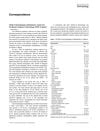 December 2023 in “Curēus”
December 2023 in “Curēus” COVID-19 vaccination does not significantly increase the risk of developing alopecia areata.
 January 2025 in “SKIN The Journal of Cutaneous Medicine”
January 2025 in “SKIN The Journal of Cutaneous Medicine” Some patients on Baricitinib for alopecia areata lost response, often linked to longer and more severe initial conditions.
 December 2022 in “International Journal of Biomedicine”
December 2022 in “International Journal of Biomedicine” Androgens may worsen COVID-19 and hair loss could indicate the disease's severity.
 25 citations,
July 2021 in “Journal of Medical Virology”
25 citations,
July 2021 in “Journal of Medical Virology” COVID-19 can cause various skin issues, including rashes and hair loss, which usually heal on their own and don't always indicate severe illness.
 2 citations,
April 2021 in “International Journal of Dermatology”
2 citations,
April 2021 in “International Journal of Dermatology” COVID-19 can cause skin issues like hives, rashes, and chickenpox-like eruptions, with women aged 31-40 being the most affected.
 January 2023 in “Acta dermatovenerologica Alpina, Pannonica et Adriatica (Tiskana izd.)”
January 2023 in “Acta dermatovenerologica Alpina, Pannonica et Adriatica (Tiskana izd.)” The article concludes that schoolchildren and adolescents experienced various skin issues during the COVID-19 pandemic, including acne from masks and other skin reactions from the virus and vaccines.
 November 2023 in “Dermatology and Therapy”
November 2023 in “Dermatology and Therapy” Baricitinib treatment helps regrow eyebrow, eyelash, and scalp hair in severe alopecia areata, improving patients' emotional well-being and quality of life.
 16 citations,
December 2020 in “International Journal of Clinical Practice”
16 citations,
December 2020 in “International Journal of Clinical Practice” The pandemic changed how often certain skin conditions were diagnosed.
 January 2024 in “American journal of clinical dermatology”
January 2024 in “American journal of clinical dermatology” Ritlecitinib is safe and well-tolerated for treating alopecia areata in patients aged 12 and older.
 71 citations,
April 2020 in “Journal of Cosmetic Dermatology”
71 citations,
April 2020 in “Journal of Cosmetic Dermatology” Genetic differences may affect COVID-19 deaths; anti-androgens could be potential treatment.

COVID-19 may trigger or worsen rapid hair loss in alopecia areata.
 May 2023 in “Journal of contemporary medicine”
May 2023 in “Journal of contemporary medicine” Using Favipiravir, a COVID-19 treatment drug, likely doesn't cause hair loss.
 123 citations,
May 2020 in “Drug Development Research”
123 citations,
May 2020 in “Drug Development Research” Men's sensitivity to male hormones might affect how severe COVID-19 gets for them.
 70 citations,
July 2020 in “Pharmacological Reports”
70 citations,
July 2020 in “Pharmacological Reports” Cepharanthine, a Japanese hair loss drug, shows promise as a COVID-19 treatment but needs more testing.
 1 citations,
September 2023 in “Dermatology and Therapy”
1 citations,
September 2023 in “Dermatology and Therapy” Baricitinib helps improve hair growth in severe alopecia, with better results in less severe cases and higher doses working faster.
 42 citations,
April 2021 in “Journal of clinical pharmacology”
42 citations,
April 2021 in “Journal of clinical pharmacology” Baricitinib helps treat several diseases, including COVID-19, but has side effects and needs careful monitoring.
 2 citations,
September 2021 in “Curēus”
2 citations,
September 2021 in “Curēus” Tofacitinib may be safe for COVID-19 patients with alopecia without worsening symptoms, based on two cases.
 October 2022 in “Revista Eletrônica Acervo Médico”
October 2022 in “Revista Eletrônica Acervo Médico” 5-Alpha-Reductase Inhibitors can cause negative side effects.
 May 2022 in “Journal of the Egyptian Women's Dermatologic Society (Print)”
May 2022 in “Journal of the Egyptian Women's Dermatologic Society (Print)” Women's hair loss can be due to hormonal changes and various conditions, with treatments focusing on stopping progression and managing symptoms.
 5 citations,
July 2021 in “medRxiv (Cold Spring Harbor Laboratory)”
5 citations,
July 2021 in “medRxiv (Cold Spring Harbor Laboratory)” Proxalutamide improved blood markers related to inflammation, immune response, and clotting in COVID-19 patients, potentially reducing hospitalizations.
 November 2024 in “Journal of Family Medicine and Primary Care”
November 2024 in “Journal of Family Medicine and Primary Care” 5 alpha reductase inhibitors can cause sexual, cognitive, and muscle side effects, and may slightly increase aggressive cancer risk.
 1 citations,
June 2023 in “Genes”
1 citations,
June 2023 in “Genes” Hair loss from Alopecia Areata is caused by both genes and environment, with several treatments available but challenges in cost and relapse remain.
 3 citations,
July 2021 in “Aesthetic Plastic Surgery”
3 citations,
July 2021 in “Aesthetic Plastic Surgery” PHAT may improve hair growth better than PRP alone.
 1 citations,
July 2020 in “Dermatology”
1 citations,
July 2020 in “Dermatology” Photobiomodulation helps reduce pain, lessen inflammation, heal wounds, and can be used in skin treatments. It also boosts hair growth in women with hair loss and may help fight microbes and prevent respiratory issues in COVID-19.

A woman regrew her hair after receiving injections of special cell-derived vesicles.
 June 2022 in “Journal of the turkish academy of dermatology”
June 2022 in “Journal of the turkish academy of dermatology” The COVID-19 quarantine in Turkey disrupted dermatological care, increased stress-related skin issues, and showed the need for psychological support and teledermatology.
 2 citations,
September 2021 in “JAAD case reports”
2 citations,
September 2021 in “JAAD case reports” Dupilumab helped a woman with severe hair loss regrow her hair quickly and maintain it for six months after stopping treatment.
October 2023 in “Journal of Gandhara medical and dental sciences” Quarantine increased hair fall, especially in young women, with no direct link to short sun exposure.
 November 2022 in “Journal of clinical images and medical case reports”
November 2022 in “Journal of clinical images and medical case reports” COVID-19 can cause hair loss in both severe and mild cases, often affecting women.
August 2024 in “Journal of Photochemistry and Photobiology B Biology” Combining light therapy with certain substances improves hair growth in people with hair loss.




























